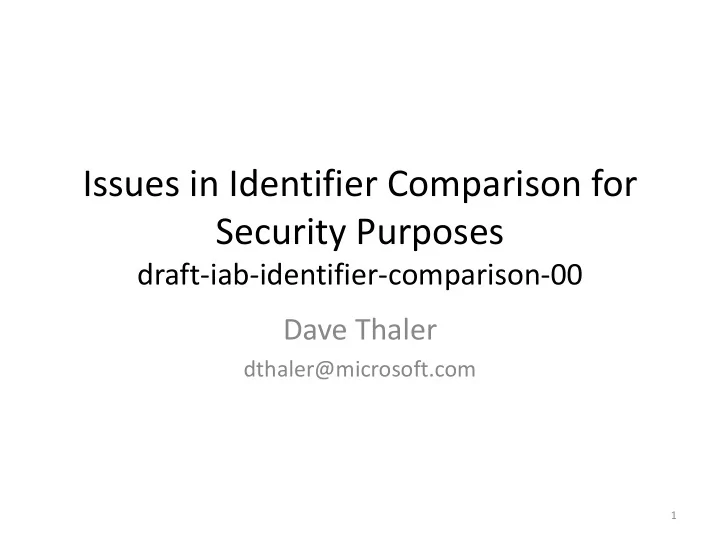

Issues in Identifier Comparison for Security Purposes draft-iab-identifier-comparison-00 Dave Thaler dthaler@microsoft.com 1
Issues in Identifier Comparison for Security Purposes • Identifiers are often compared for security purposes, e.g.: – Generation : • Create a “unique” value that is “different” from previously generated ids – Authentication : • Match a security principal id to get keying material • Match keying material – Authorization: • Match a resource name to get ACL • Match a security principal id in ACL 2
Example of a Simple Security Exchange 3
Types of Identifiers • Absolute: exact comparison – Ex: (binary) IPv4 address • Definite: single globally-agreed on comparison – Ex: URI scheme name is ASCII-only case-insensitive and contains no %-escapes • Indefinite: no single globally-agreed on algo. – Ex: human name 4
It’s probably worse than you think… Many identifiers are at best Definite and often turn out to be Indefinite. Example: IPv4 literals or not? And do these match or not? – 192.168.1.2 – 192.168.258 – 0xC0.0xA8.0x1.0x2 – 030052000402 Answer for all of the above: Maybe. Even the term “standard dotted decimal” is ambiguous. 5
Effect of False Positives/Negatives “Grant on match” “Deny on match” False positive “match” Elevation of Privilege Denial of Service False negative Denial of Service Elevation of Privilege • EoP almost always far worse than DoS – E.g. RFC 3986 for URIs "comparison methods are designed to minimize false negatives while strictly avoiding false positives". • Using URIs in a "deny on match" system can thus be problematic. 6
Strawman Recommendations (1/2) • Any system using both grant-on-match AND deny-on-match should not use Indefinite identifiers (Absolute ids have least chance of bugs). • Any new identifiers should specify an Absolute or Definite comparison algorithm. • If extensibility is allowed then the comparison algorithm should remain invariant, so that unrecognized extensions can be compared. 7
Strawman Recommendations (2/2) • Some issues (e.g. unrecognized extensions) can be mitigated by treating such ids as invalid (see RFC 3696). • Security protocols designed for use with other protocols should either: a) specify the comparison algorithm, and ONLY be used by protocols that use the same algorithm, or b) Support “matching algorithm” agility and use the one indicated by the using protocols. • When a collection of protocols are used together this may still mean all need to use the same algorithm. 8
Discussion • i18n-discuss@iab.org 9
Recommend
More recommend